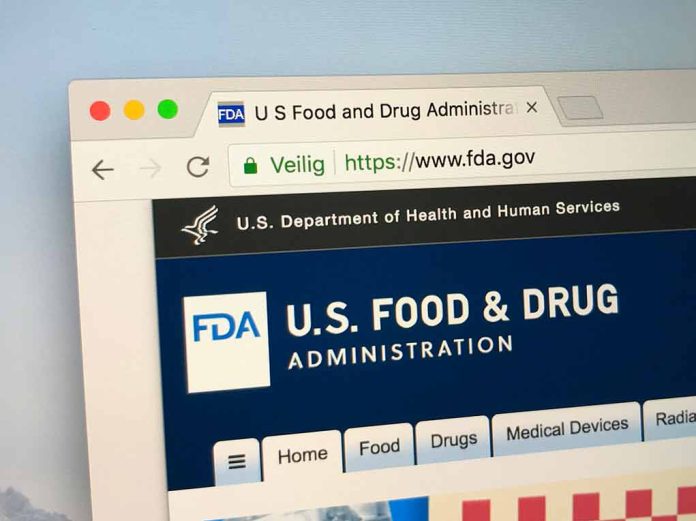
Four Americans infected with Salmonella after consuming Turkish-imported pistachio cream, with one hospitalization prompting a nationwide health alert from the CDC as the contaminated product continues to be sold across the country.
Key Takeaways
- A Salmonella outbreak linked to Emek-brand pistachio cream has sickened four people in Minnesota and New Jersey, with one requiring hospitalization
- The contaminated product is Emek-brand pistachio cream with an October 19, 2026 use-by date, imported from Turkey and sold in 11-pound (5-kilogram) white tubs
- The CDC and FDA are actively investigating the outbreak and have advised consumers, retailers, and restaurants to stop consuming, selling, or serving the affected product
- The pistachio cream was distributed nationwide to wholesale distributors, restaurants, and food service locations, with three cases linked to a single Minnesota restaurant
Contaminated Pistachio Cream Prompts National Alert
Federal health agencies have identified a dangerous Salmonella outbreak linked to imported Emek-brand pistachio cream that has already sickened four Americans in Minnesota and New Jersey. The contaminated product, which bears a use-by date of October 19, 2026, was imported from Turkey and distributed nationwide to restaurants, food service locations, and wholesale distributors in bulk 11-pound (5-kilogram) white tubs. Of particular concern to health officials is that three of the four identified cases were traced to a single Minnesota restaurant, suggesting the potential for more widespread contamination.
“Four people have been sickened in two states by salmonella poisoning linked to pistachio cream, a nut butter spread used in desserts and other dishes,” stated federal health officials.
The Minnesota Department of Health first alerted the FDA after identifying positive Salmonella samples in the pistachio cream, which prompted an immediate investigation. One patient required hospitalization, highlighting the potentially serious nature of this foodborne illness. The CDC has issued a clear directive on the contaminated product: “The product should not be sold, distributed, or served,” leaving no room for ambiguity about the potential dangers of this imported food item.
Three people in Minnesota and one in New Jersey fell ill between March 10 and May 19. https://t.co/5sc02e84ka
— News19 WLTX (@WLTX) June 16, 2025
Symptoms and Risk Factors for Vulnerable Populations
Salmonella infection can cause significant health complications, particularly for certain segments of the population. The CDC warns that symptoms typically appear between 6 hours to 6 days after exposure and commonly include fever, stomach cramps, and diarrhea. While most healthy individuals recover without medical intervention within 4 to 7 days, certain groups face substantially higher risks. Young children under 5, adults over 65, and those with weakened immune systems are particularly vulnerable to severe illness that may require medical attention.
“Salmonella is a group of bacteria that can cause gastrointestinal illness and fever called Salmonellosis,” stated CDC.
Health officials are advising anyone who has consumed the contaminated pistachio cream and develops severe symptoms to contact their healthcare provider immediately. These warning signs include high fever, prolonged or bloody diarrhea, excessive vomiting, and signs of dehydration. The CDC has also issued specific guidance for those who may have the product in their possession, recommending thorough washing and sanitizing of any items and surfaces that may have come into contact with the contaminated cream to prevent further spread of the bacteria.
Ongoing Investigation and Response
The FDA and CDC are conducting an active investigation to determine the full scope of the product’s distribution and identify any additional cases that may be linked to this outbreak. As of June 13, 2025, the confirmed case count stands at four, but this number could rise as the investigation progresses. Health officials are particularly concerned about restaurants and food service establishments that may still have the product in their inventory and could unknowingly serve it to customers.
“The outbreak was linked to Emek-brand Pistachio Cream and was sold and imported to wholesale distributors, restaurants, and food service locations,” according to FDA and CDC.
The current outbreak raises questions about the effectiveness of our food safety inspection system for imported products, especially as the USDA recently withdrew a Biden-era proposed salmonella regulation in raw poultry. While the FDA has regulatory authority over imported foods like the pistachio cream, this incident underscores the ongoing challenges in ensuring the safety of the American food supply, especially for products originating from foreign countries with potentially different safety standards. The Trump administration continues to prioritize strengthening inspection protocols and accountability measures for imported food products.













